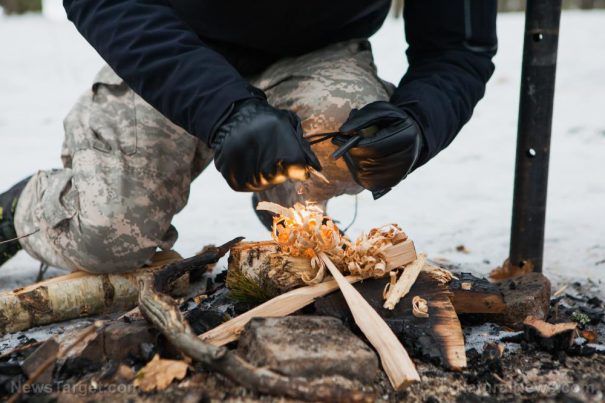Don’t let these 7 common mistakes leave you hanging in the wilderness
Thursday, August 01, 2019 by Zoey Sky
http://www.bugout.news/2019-08-01-dont-let-these-7-common-mistakes-leave-you-hanging-in-the-wilderness.html

Preppers know that you need to avoid common mistakes to survive the outdoors, like not knowing how to start a fire or not wearing weather-appropriate clothing.
Whether you’re new to prepping or an experienced survivalist, it pays to know which mistakes to avoid if you want to survive the wilderness. (h/t to OffGridSurvival.com)
Not knowing the 5 keys to wilderness survival
Without these five things, your chances of surviving when SHTF drastically decreases.
- Shelter – Regardless of the weather, you’ll need a basic shelter to protect yourself from the elements.
- Water – When SHTF, having access to clean water is a must. You can’t survive for more than three days without water.
- Food – You can survive for at least three weeks without food, but this will severely weaken you and lower your chances of survival.
- Fire – You’ll need fire to cook food, boil water, and stay warm. A campfire can also help keep predators away and signal rescuers.
- Signal – When traveling outdoors, always bring tools that you can use to signal for help, such as flares, a mirror, and a whistle. If you’re stranded outdoors, these items may literally save your life.
You should also consider what some preppers call the sixth key – naturalist knowledge. Knowing how to hunt or forage for wild edibles is crucial when SHTF.
Not knowing how to start a fire
If you can’t start a fire, you can’t stay warm, cook food, or boil water for drinking.
Even if you lose your lighter or matches, you can try to start a fire by having kindling, like dry leaves or small pieces of bark that catch easily. Once you light your kindling on fire, slowly add small branches then work your way up to larger branches or fallen logs so the fire will last longer.
If you don’t have a firestarter, make do with your eyeglasses or a mirror. Use the lens to focus sunlight in your kindling. To signal search parties, add green wood fresh off the tree into your fire. This will generate a lot of smoke, which makes your campsite easier to find.
Practice your firestarting skills before SHTF so you can settle on a technique that you’re familiar with.
Drinking water without purifying it first
Water from a clear brook isn’t always safe to drink. When in doubt, purify. If you’re thirsty, resist the urge to drink that crystal-clear water. Waiting several minutes can help prevent negative side effects like diarrhea and vomiting.
Always bring a survival straw, water purification tablets, and sturdy water bottle in your survival backpack. (Related: 4 Bad ideas that can get you killed when SHTF.)
Eating the wrong thing
Learning how to forage properly is another crucial skill that can save your own life and the life of your whole survival group. You can find food in the wild, but you need to know how to differentiate between delicious mushrooms and deadly ones that might just kill you.
Never cook or eat anything you can’t identify 100 percent.
Not wearing weather-appropriate clothing
Not wearing enough layers or wearing too much clothing can make or break the wilderness experience. Before you go hiking or camping, check what the weather’s going to be like.
When faced with a survival scenario, remember that you need to stay dry whenever you can so you can stay warm, especially if it’s particularly cold, and to avoid infections or just gross, damp socks while trekking.
Bring a light rain poncho and build a fire so you can dry off immediately if you get caught in a downpour.
Not double-checking the weather forecast
Familiarize yourself with the climate of the area that you’re traveling in so you can wear the appropriate clothing and pack the necessary gear. Remember that northern climates are cold and dry, which increases your risk of suffering from hypothermia when SHTF. Meanwhile, southern climates are often warm and humid, which presents risks such as heat stroke or dehydration.
Traveling without navigational tools
Learn how to use navigational tools like a map and compass. Bring them without you so you can find your way back to camp.
If SHTF, search and rescue teams will have an easier time locating you if you stay put.
Avoid these seven mistakes and learn about crucial survival skills like firestarting, purifying water, and foraging so you can fend for yourself when SHTF.
Sources include:
Tagged Under: Tags: bug out, camping, Collapse, disaster, emergency, firestarter, food supply, Gear, hiking, homesteading, off grid, preparedness, prepping, self sufficiency, self-reliance, shelter, SHTF, signaling, survival, survival mistakes, survival skills, tools, water, weather, wilderness survival

